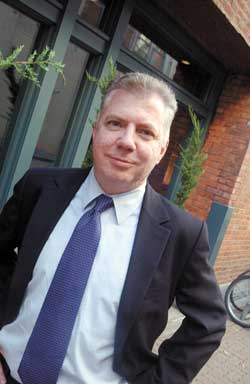From the second he ascended to the head of the state House Transportation Committee in January, Rep. Ed Murray, D-Seattle, began a complicated balancing act. The voters had overwhelmingly rejected Referendum 51, the statewide gas-tax measure he vocally supported, in November. The Republicans narrowly controlled the state Senate and the Democrats narrowly controlled the state House of Representatives, creating a recipe for gridlock between the Legislatures two chambers. And the pro-transit lobby, which opposed R-51, had deserted Murray like a sinking ship after the divisive election in November. It was back to ground zero and time for Murray to produce.
Has he done it? Just past the midpoint of the Legislatures 105-day session, Murray has managed to push through several key goals that are either crucial reforms of the states transportation system or symbolic gestures that accomplish little, depending on whom you talk to. Hes passed three notable pieces of legislation out of his committee. One would mandate performance audits of state transportation agencies, another would abolish the state Transportation Commission and hand more power to the Legislature, and the third created a panel to oversee the states transportation system. (All three bills face an uncertain fate in the Senate.) Meanwhile, an ambitious Murray proposal to create a new ber-agency to oversee the regions transportation planning moved forward, while a batch of monorail accountability proposalsincluding one that would make it easier to dissolve the agency and another that would have handed most monorail board appointments to the Seattle mayorhave fizzled.
Murray is known as a deal maker. Hes very inclusivehe really wants to bring people along, says Murrays colleague Rep. Sandra Romero, D-Olympia, whos serving her eighth year on the transportation committee.
Aaron Ostrom, the director of the environmentalist group 1000 Friends of Washington, a longtime Murray friend and one of the chief opponents of R-51, calls the legislator a fighteryou want him on your side, but hes never had a problem being willing to compromise.
Others say Murray can be prickly and difficult to work with; everyone, it seems, has a story about Murrays notorious temper.
Still, most agree that his tenacity has served him well in the Legislature. On volatile issues like transportation, he holds his ground. He firmly believes the Seattle Popular Monorail Authority is plowing ahead too quickly and worries that staff members at the agency dont understand the basics of transportation bonding. He resisted passing a package of legislative fixes that would grant the monorail a more favorable bond rating. He wants any regional transportation package for the Puget Sound region to include significant money for transit, although he says the Senate has been absolutely unwilling to consider that possibility. And on Sound Transit, hes been both a critic and a supporter, giving the agencys plan to send light rail through his Capitol Hill district a thumbs-up while proposing legislation that would shrink the Sound Transit board to half its current size. I can be a supporter of the monorail or Sound Transit and still be a critic in trying to make their agencies more effective, Murray says.
The real test of Murrays political acumen will be negotiating a statewide transportation package that can be approved outright by the Legislature. To that end, hes been working feverishly behind the scenes to come up with a package that everyoneincluding Senate Republicans, many of whom have signed pledges to pass no new taxes, and transit advocates, who worry that his package will simply be a smaller version of the highway-heavy R-51can live with.
From the looks of it, Murray is in no mood to negotiate with the pro-transit lobby that helped bring R-51s defeat. There is one group of extremists who seem to be unwilling to be satisfied no matter what we do, Murray says. Transit advocates were unable to support what was the largest non-roads project [R-51] that ever came out of the state Legislature. Now the environmentalists might have to be satisfied with half a loafbetween a 3- and 5-cent gas-tax increase, according to those familiar with the negotiations, plus various fees to pay for between $125 million and $700 million in non-roads projects while pumping $2 billion to $3 billion into highways, bridges, and roads.
Expanded passenger ferries? In your dreams. More money for commuter rail? Not in this lifetime. Well be lucky, Murray says, if we manage to keep transit programs at their current levels. We could easily leave this Legislature tying up passenger ferries [at the dock] and parking our passenger trains. That would be a tragedy, Murray says. Thats really the struggle now: All the extras we added in R-51 to expand our non-roads systems are off the table, he adds.
Negotiating with Senate Republicans can be like walking through a minefield, as Ruth Fisher, Murrays predecessor on the transportation hot seat, can attest. The state Senates Highways and Transportation chair Jim Horn, RMercer Islandwho didnt return a call in time to comment for this storyis a roads man, Fisher says; the Republicans district includes I-405, and any transportation package will have to include money for that north-south freeway to win his signature. Ive always thought they should find an office on the fourth floor and call it 405 and put him in there, Fisher says. Jim has a real bias against transit. Environmentalist Ostrom compares the task of getting Horn to agree to even minimal amounts of transit money to performing a miracle.
But if anyone can do it, his colleagues say, Ed can. I have every faith that hes going to come out with a good revenue package, says Rep. Romero. But if it falls apart, in my mind, it would reflect more on the Senate than the House, she says.
Fisher agrees, noting that anti-tax sentiment now holds sway in the Senate and at the ballot box. Its like that commercial where the woman goes to the bank and she wants everything to be free, Fisher says. Thats how people are on transportation: They want everything, but they dont want to pay for it.
At the halfway mark, its too early to say whether Murrays compromising, lets-make-a-deal ways will win him what no transportation chair for 13 years has been able to attain: a tax increase to build roads, fund transit, and pay for statewide safety and maintenance needs. Even if he manages, he wont please everyone: Transit proponents will almost certainly be unhappy with R-51 lite, and the pave-it-all lobby wont settle for less than an 18-lane 405 through downtown Bellevue.
It is, as Fisher notes, a tightrope walk; well know by April whether Ed Murray will be the first to do it without falling off.







